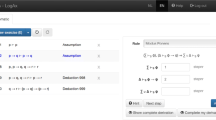Abstract
The DISCOUNT system is a distributed equational theorem prover based on the teamwork method for knowledge-based distribution. It uses an extended version of unfailing Knuth–Bendix completion that is able to deal with arbitrarily quantified goals. DISCOUNT features many different control strategies that cooperate using the teamwork approach. Competition between multiple strategies, combined with reactive planning, results in an adaptation of the whole system to given problems, and thus in a very high degree of independence from user interaction. Teamwork also provides a suitable framework for the use of control strategies based on learning from previous proof experiences. One of these strategies forms the core of the expert global_learn, which is capable of learning from successful proofs of several problems. This expert, running sequentially, was one of the entrants in the competition (DISCOUNT/GL), while a distributed DISCOUNT system running on two workstations was another en trant.
Similar content being viewed by others
References
Avenhaus, J. and Denzinger, J.: Distributing equational theorem proving, in Proc. of the 5th RTA, Montreal, LNCS 690, Springer, 1993, pp. 62–76.
Bachmair, L., Derschowitz, N. and Plaisted, D. A.: Completion without failure, in Coll. on the Resolution of Equations in Algebraic Structures, Austin, 1987, Academic Press, 1989.
Denzinger, J.: Teamwork: Eine Methode zum Entwurf verteilter, wissensbasierter Theorembeweiser, PhD thesis, Fachbereich Informatik, Universität Kaiserslautern, 1993 (German Language).
Denzinger, J.: Knowledge-based distributed search using teamwork, in Proc. of the ICMAS-95, San Francisco, AAAI Press, 1995, pp. 81–88.
Denzinger, J. and Fuchs, D.: Referees for teamwork, in Proc. 9th FLAIRS, Key West, 1996, pp. 454–458.
Denzinger, J. and Fuchs, M.: Goal oriented equational theorem proving using teamwork, in Proc. of the KI94, Saarbrücken, LNAI 861, Springer, 1994, pp. 343–354.
Denzinger, J. and Kronenburg, M.: Planning for distributed theorem proving: The teamwork approach, in Proc. 20th KI, Dresden, LNAI 1137, Springer, 1996, pp. 43–56.
Denzinger, J. and Schulz, S.: Analysis and Representation of Equational Proofs Generated by a Distributed Completion Based Proof System, Seki-Report SR-94-05, Universität Kaiserslautern, 1994.
Denzinger, J. and Schulz, S.: Learning domain knowledge to improve theorem proving, in M. A. McRobbie and J. K. Slaney (eds), Proc. of the 13th CADE, New Brunswick, LNAI 1104, Springer, 1996, pp. 62–76.
Denzinger, J. and Schulz, S.: Recording and analysing knowledge-based distributed deduction processes, Journal of Symbolic Computation (Special Issue on Parallel Symbolic Computation), to appear, 1996.
Fuchs, M.: Learning proof heuristics by adapting parameters, in Proc. of the 12th International Workshop on Machine Learning, Morgan Kaufmann, San Mateo, CA, 1995, pp. 235–243.
Hillenbrand, T., Buch, A., Vogt, R. and Löchner, B.: Waldmeister: High performance equational deduction, Journal of Automated Reasoning 18(2) (1997).
Author information
Authors and Affiliations
Rights and permissions
About this article
Cite this article
Denzinger, J., Kronenburg, M. & Schulz, S. DISCOUNT - A Distributed and Learning Equational Prover. Journal of Automated Reasoning 18, 189–198 (1997). https://doi.org/10.1023/A:1005879229581
Issue Date:
DOI: https://doi.org/10.1023/A:1005879229581




